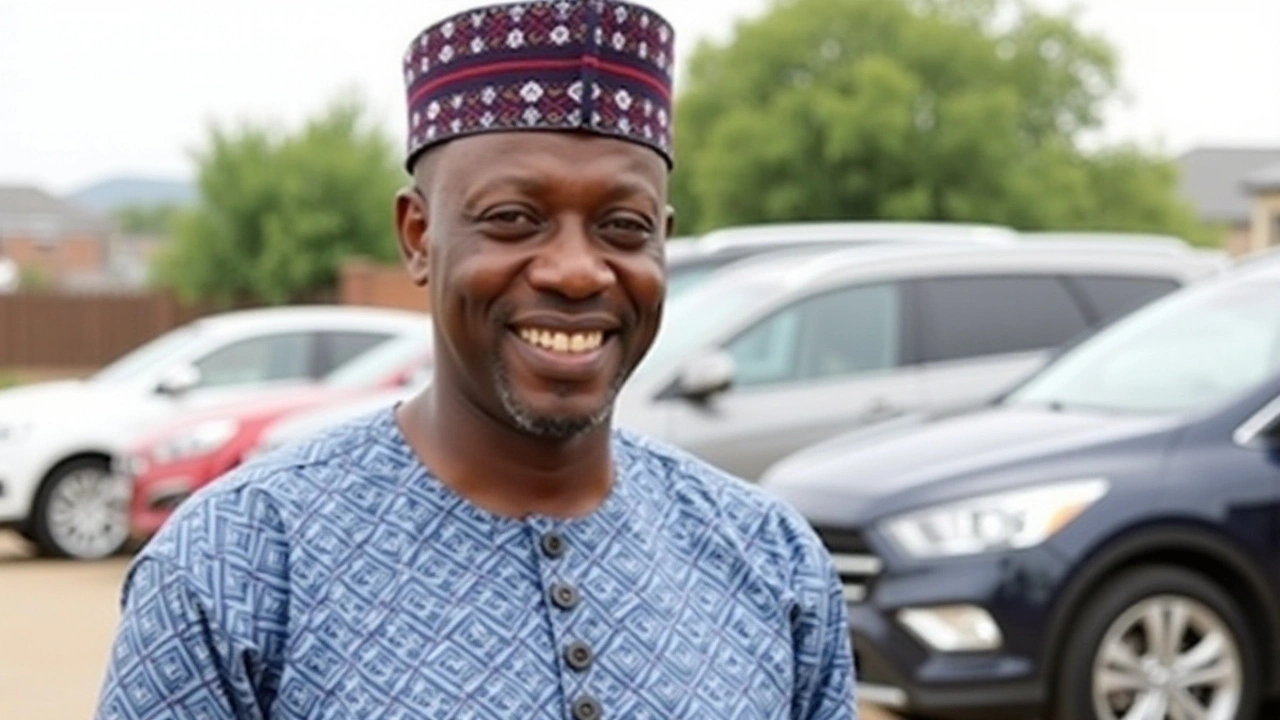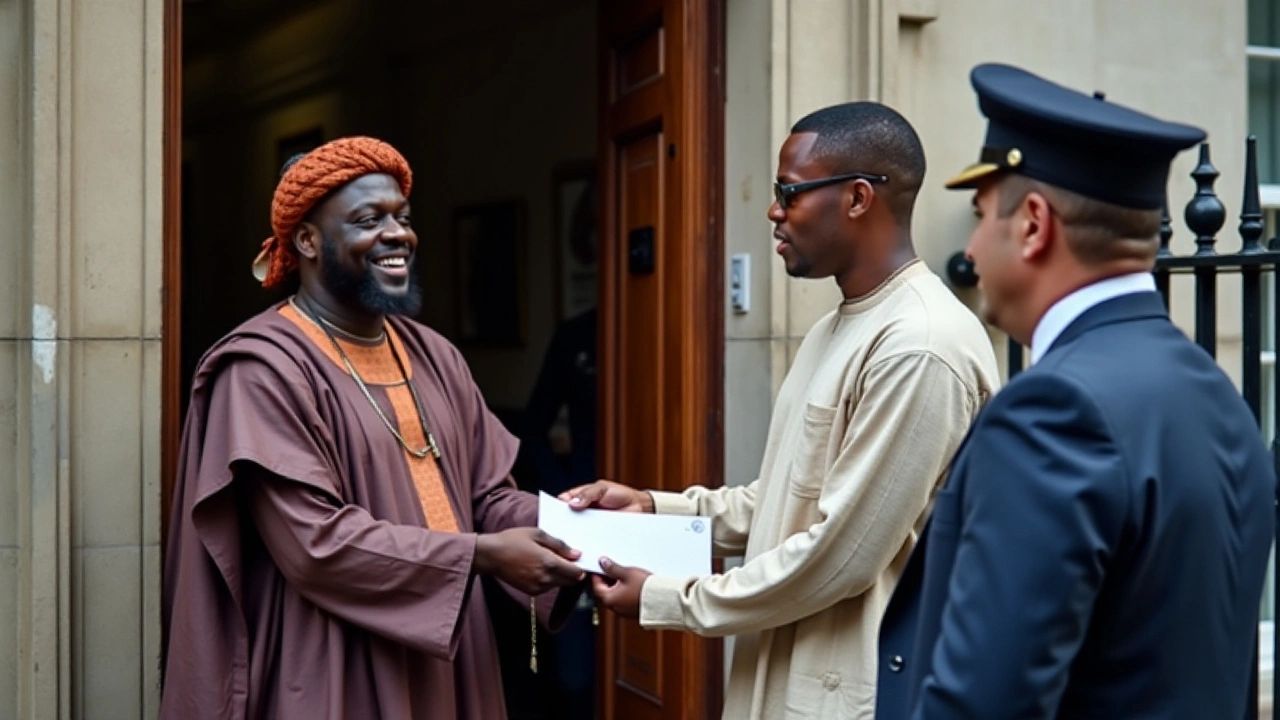Yoruba Nation Campaigner Sunday Igboho Appeals to UK Prime Minister for Support
 Oct, 14 2024
Oct, 14 2024
Sunday Igboho's Appeal to UK Prime Minister
Sunday Igboho, well-known for his activism in advocating for the Yoruba Nation's independence, recently filed a significant petition to the Prime Minister of the United Kingdom. This engagement is important as it represents an outsider’s appeal to an influential global leader, Keir Starmer, aiming to garner international support for the Yoruba autonomous movement. On the surface, it appears a symbolic move but holds deeper layers of political strategy. Igboho's petition submission underscores the formidable struggle for self-determination that is ongoing in Nigeria's Southwest region among the indigenous Yoruba people.
Accompanying Delegation at 10 Downing Street
Igboho was not alone in this endeavor; he was accompanied by several notable dignitaries, including the Diaspora Youth Leader, Prophet Ologunoluwa; Fatai Ogunribido, Vice President of Ifeladun Apapo; Alhaja Adeyeye, General Secretary of Yoruba World Media; and Paul Odebiyi, a member of the Yoruba Nation Movement. Together, this group symbolically represents the breadth and seriousness of the Yoruba people's aspirations, amplifying the gravity of the situation to an international audience.
The Significance of the United Kingdom's Role
The choice to submit the petition in London at 10 Downing Street is strategic, given the historical ties between Nigeria and the United Kingdom. The UK played a significant role in Nigeria's formation during the colonial era, and advocating for intervention indicates a complex layer of post-colonial diplomacy. The Yoruba Nation movement seeks to leverage these ties; the historical connection adds a unique dimension to their plea, potentially serving as a reminder to the UK of its cultural and ethical commitment to former colonies.
Background of Tensions and Political Struggles
Sunday Igboho's activist journey has been marred with tribulations, notably with the Nigerian government. His home in Ibadan was famously raided by the Department of State Services (DSS) in July 2021, an event which escalated tensions. Furthermore, Igboho's later detention in the Benin Republic added to his infamous rapport; he spent time incarcerated until an ECOWAS court ruled his detention unlawful, awarding him compensation. These incidents have not stifled his fervor but perhaps have fueled further the fire for his quest for autonomy.

The Vision for an Independent Yoruba Nation
The idea of a sovereign Yoruba Nation has been gaining momentum steadily over recent years. The movement, led by influential figures such as Professor Adebanji Akintoye, aspires to establish governance that better represents the Yoruba people's uniqueness and cultural identity separate from the current Nigerian state. This ambition is not just about governance but about cultural preservation and identity assertion that has faced challenges within Nigeria's diverse socio-political landscape.
Implications and Future Prospects
This action by Igboho and his accompanying delegation could potentially be a landmark step, depending on the reaction from UK authorities and the international community. The geopolitical implications of such separatist movements call for careful contemplation. Understanding the aspirations of such ethnic groups is crucial in a world where cultural and regional autonomy sentiments are becoming more pronounced. Igboho's petition thus is not merely a document for review; it is a testament to a people emboldened by a past filled with challenges, relentlessly pursuing what they believe to be their rightful destiny.
The Road Ahead
What remains on the horizon is the outcome of this strategic endeavor. Will the UK government's former colonial ties spur a supportive reaction, or will the petition serve as a mere statement of intent from the Yoruba Nation leaders? Only time will tell. Nonetheless, Sunday Igboho’s determination highlights the ongoing struggles facing many traditional groups worldwide, seeking a balance between modern self-governance and historical identities. This engagement is both a continuance of Yoruba advocacy and a significant marker of international diplomacy.

Derek Pholms
October 14, 2024 AT 07:07Stephanie Reed
October 14, 2024 AT 12:21Brian Gallagher
October 16, 2024 AT 03:10Mark Dodak
October 16, 2024 AT 16:22Harry Adams
October 16, 2024 AT 23:12Joshua Gucilatar
October 17, 2024 AT 09:46Ronda Onstad
October 18, 2024 AT 11:03Akul Saini
October 19, 2024 AT 03:28musa dogan
October 19, 2024 AT 10:11Arvind Singh Chauhan
October 21, 2024 AT 02:44AAMITESH BANERJEE
October 22, 2024 AT 17:42Akshat Umrao
October 23, 2024 AT 00:36Sonu Kumar
October 24, 2024 AT 21:35sunil kumar
October 26, 2024 AT 05:22Jason Lo
October 27, 2024 AT 03:34Elizabeth Alfonso Prieto
October 28, 2024 AT 17:08Kieran Scott
October 29, 2024 AT 22:09jesse pinlac
October 30, 2024 AT 19:11Jess Bryan
November 1, 2024 AT 07:12